HRM: Role, Scope, and Impact on Unilever's Success
VerifiedAdded on 2021/02/20
|13
|4119
|99
Report
AI Summary
This report provides a detailed analysis of Human Resource Management (HRM), focusing on its role and scope within an organization, using Unilever as a case study. It explores the purpose and functions of HRM, particularly in workforce planning and resourcing, and evaluates the strengths and weaknesses of different recruitment and selection approaches. The report further examines the benefits of various HRM practices, such as training and development, flexible working, and performance management, for both employers and employees, assessing their effectiveness in raising organizational profit and productivity. It also addresses the importance of employee relations and key elements of employee legislation within HRM. The report concludes with an overview of how these HRM practices are applied in a real-world context, providing insights into Unilever's strategies for achieving its business objectives through effective people management.
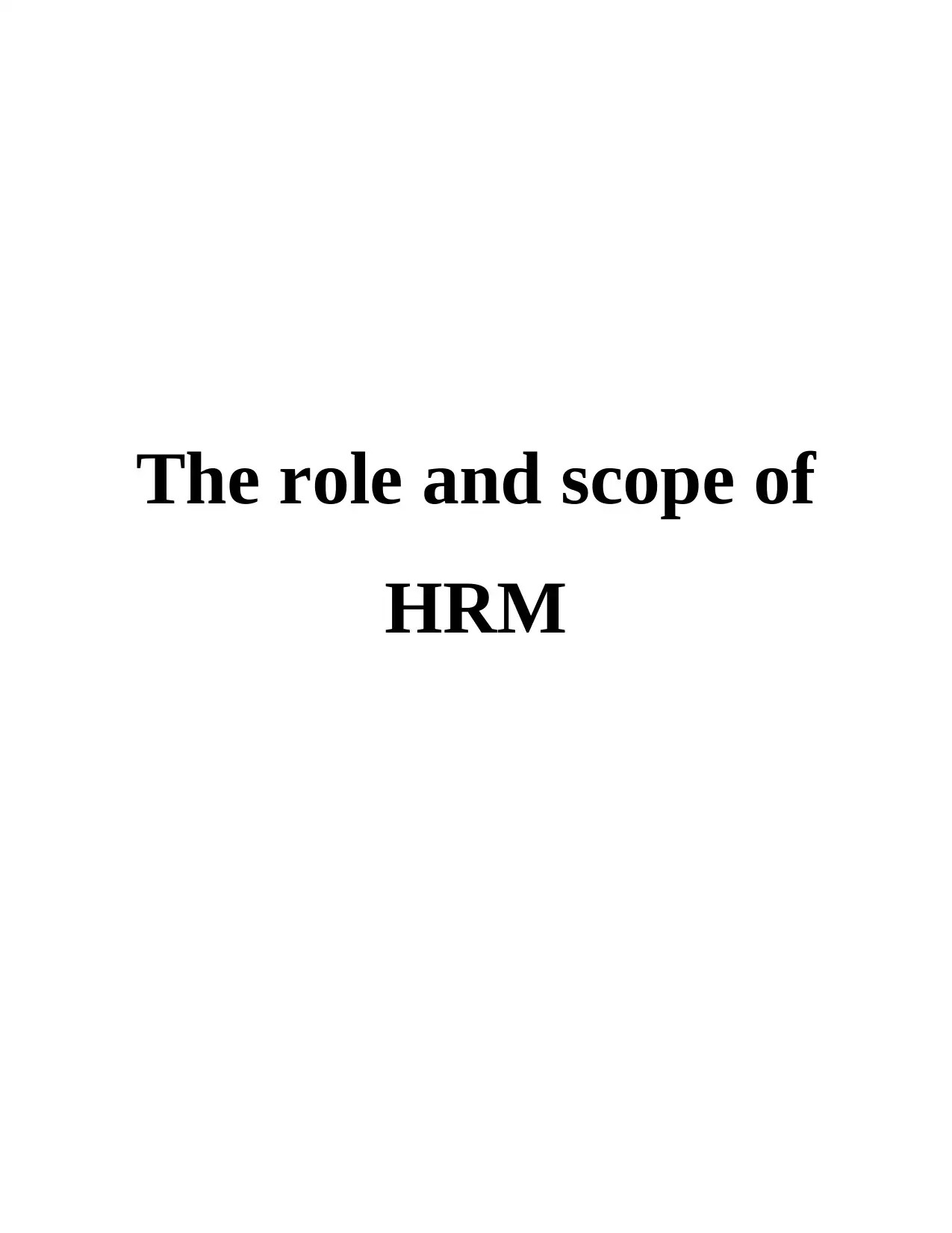
The role and scope of
HRM
HRM
Paraphrase This Document
Need a fresh take? Get an instant paraphrase of this document with our AI Paraphraser
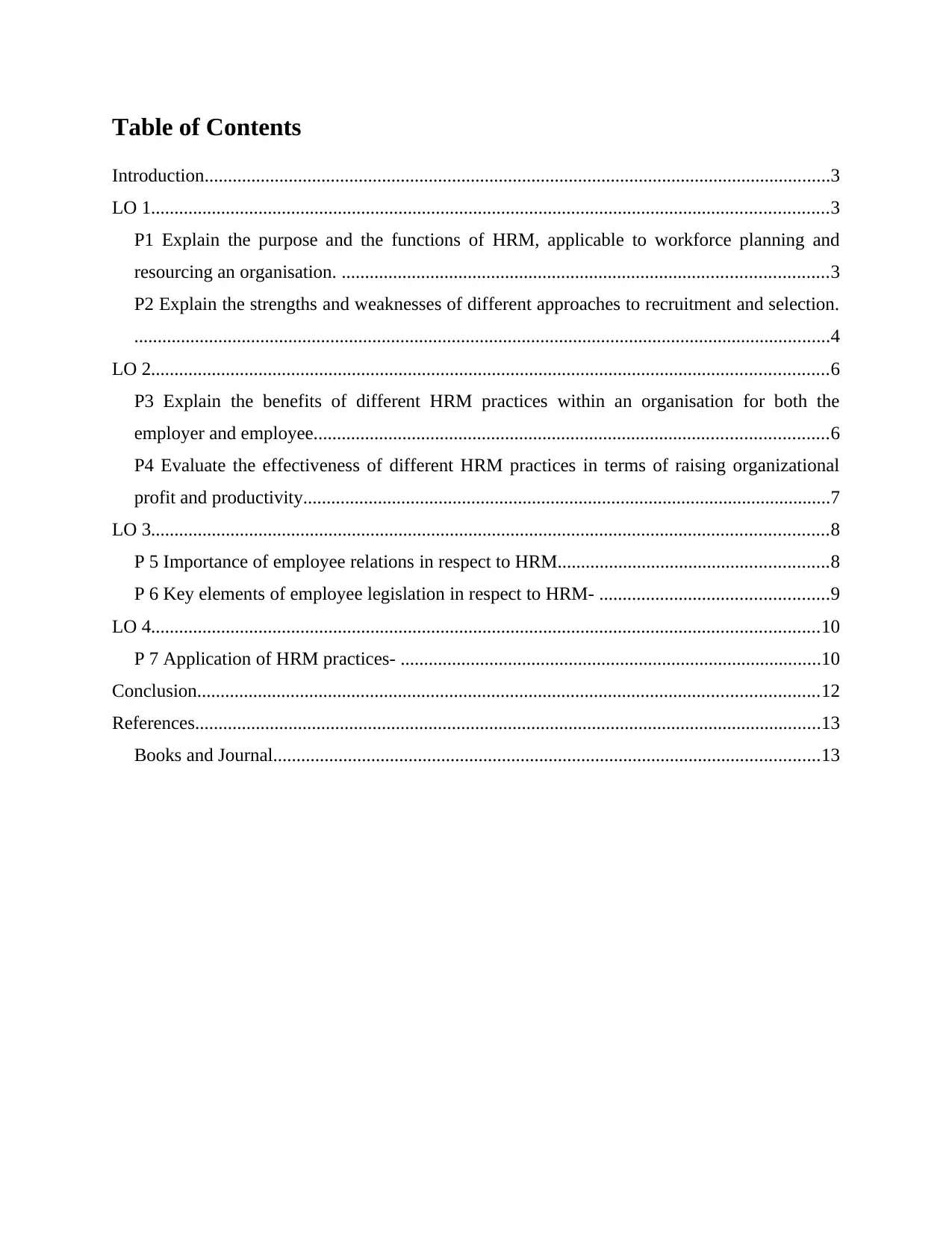
Table of Contents
Introduction......................................................................................................................................3
LO 1.................................................................................................................................................3
P1 Explain the purpose and the functions of HRM, applicable to workforce planning and
resourcing an organisation. ........................................................................................................3
P2 Explain the strengths and weaknesses of different approaches to recruitment and selection.
.....................................................................................................................................................4
LO 2.................................................................................................................................................6
P3 Explain the benefits of different HRM practices within an organisation for both the
employer and employee..............................................................................................................6
P4 Evaluate the effectiveness of different HRM practices in terms of raising organizational
profit and productivity.................................................................................................................7
LO 3.................................................................................................................................................8
P 5 Importance of employee relations in respect to HRM..........................................................8
P 6 Key elements of employee legislation in respect to HRM- .................................................9
LO 4...............................................................................................................................................10
P 7 Application of HRM practices- ..........................................................................................10
Conclusion.....................................................................................................................................12
References......................................................................................................................................13
Books and Journal.....................................................................................................................13
Introduction......................................................................................................................................3
LO 1.................................................................................................................................................3
P1 Explain the purpose and the functions of HRM, applicable to workforce planning and
resourcing an organisation. ........................................................................................................3
P2 Explain the strengths and weaknesses of different approaches to recruitment and selection.
.....................................................................................................................................................4
LO 2.................................................................................................................................................6
P3 Explain the benefits of different HRM practices within an organisation for both the
employer and employee..............................................................................................................6
P4 Evaluate the effectiveness of different HRM practices in terms of raising organizational
profit and productivity.................................................................................................................7
LO 3.................................................................................................................................................8
P 5 Importance of employee relations in respect to HRM..........................................................8
P 6 Key elements of employee legislation in respect to HRM- .................................................9
LO 4...............................................................................................................................................10
P 7 Application of HRM practices- ..........................................................................................10
Conclusion.....................................................................................................................................12
References......................................................................................................................................13
Books and Journal.....................................................................................................................13
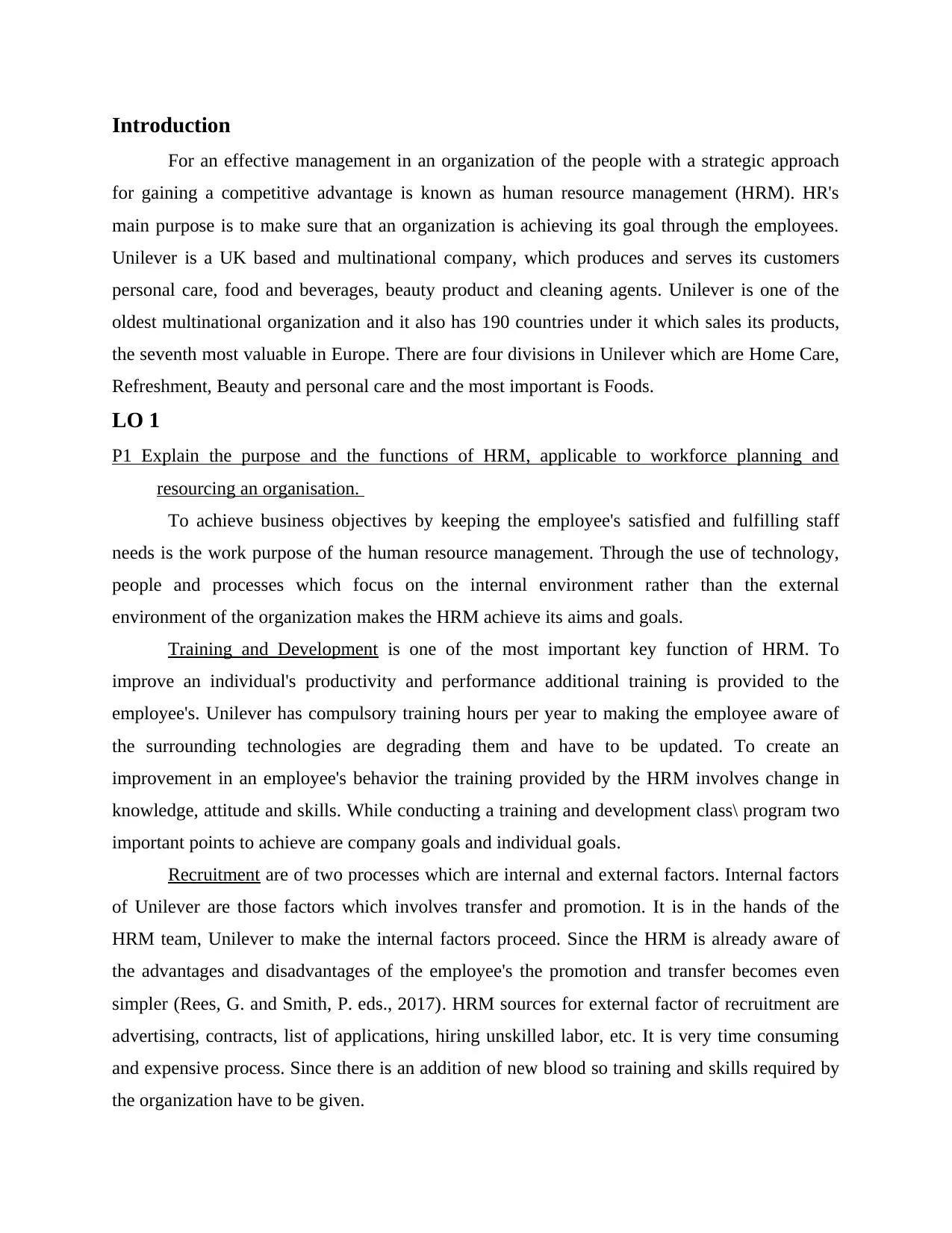
Introduction
For an effective management in an organization of the people with a strategic approach
for gaining a competitive advantage is known as human resource management (HRM). HR's
main purpose is to make sure that an organization is achieving its goal through the employees.
Unilever is a UK based and multinational company, which produces and serves its customers
personal care, food and beverages, beauty product and cleaning agents. Unilever is one of the
oldest multinational organization and it also has 190 countries under it which sales its products,
the seventh most valuable in Europe. There are four divisions in Unilever which are Home Care,
Refreshment, Beauty and personal care and the most important is Foods.
LO 1
P1 Explain the purpose and the functions of HRM, applicable to workforce planning and
resourcing an organisation.
To achieve business objectives by keeping the employee's satisfied and fulfilling staff
needs is the work purpose of the human resource management. Through the use of technology,
people and processes which focus on the internal environment rather than the external
environment of the organization makes the HRM achieve its aims and goals.
Training and Development is one of the most important key function of HRM. To
improve an individual's productivity and performance additional training is provided to the
employee's. Unilever has compulsory training hours per year to making the employee aware of
the surrounding technologies are degrading them and have to be updated. To create an
improvement in an employee's behavior the training provided by the HRM involves change in
knowledge, attitude and skills. While conducting a training and development class\ program two
important points to achieve are company goals and individual goals.
Recruitment are of two processes which are internal and external factors. Internal factors
of Unilever are those factors which involves transfer and promotion. It is in the hands of the
HRM team, Unilever to make the internal factors proceed. Since the HRM is already aware of
the advantages and disadvantages of the employee's the promotion and transfer becomes even
simpler (Rees, G. and Smith, P. eds., 2017). HRM sources for external factor of recruitment are
advertising, contracts, list of applications, hiring unskilled labor, etc. It is very time consuming
and expensive process. Since there is an addition of new blood so training and skills required by
the organization have to be given.
For an effective management in an organization of the people with a strategic approach
for gaining a competitive advantage is known as human resource management (HRM). HR's
main purpose is to make sure that an organization is achieving its goal through the employees.
Unilever is a UK based and multinational company, which produces and serves its customers
personal care, food and beverages, beauty product and cleaning agents. Unilever is one of the
oldest multinational organization and it also has 190 countries under it which sales its products,
the seventh most valuable in Europe. There are four divisions in Unilever which are Home Care,
Refreshment, Beauty and personal care and the most important is Foods.
LO 1
P1 Explain the purpose and the functions of HRM, applicable to workforce planning and
resourcing an organisation.
To achieve business objectives by keeping the employee's satisfied and fulfilling staff
needs is the work purpose of the human resource management. Through the use of technology,
people and processes which focus on the internal environment rather than the external
environment of the organization makes the HRM achieve its aims and goals.
Training and Development is one of the most important key function of HRM. To
improve an individual's productivity and performance additional training is provided to the
employee's. Unilever has compulsory training hours per year to making the employee aware of
the surrounding technologies are degrading them and have to be updated. To create an
improvement in an employee's behavior the training provided by the HRM involves change in
knowledge, attitude and skills. While conducting a training and development class\ program two
important points to achieve are company goals and individual goals.
Recruitment are of two processes which are internal and external factors. Internal factors
of Unilever are those factors which involves transfer and promotion. It is in the hands of the
HRM team, Unilever to make the internal factors proceed. Since the HRM is already aware of
the advantages and disadvantages of the employee's the promotion and transfer becomes even
simpler (Rees, G. and Smith, P. eds., 2017). HRM sources for external factor of recruitment are
advertising, contracts, list of applications, hiring unskilled labor, etc. It is very time consuming
and expensive process. Since there is an addition of new blood so training and skills required by
the organization have to be given.
⊘ This is a preview!⊘
Do you want full access?
Subscribe today to unlock all pages.

Trusted by 1+ million students worldwide
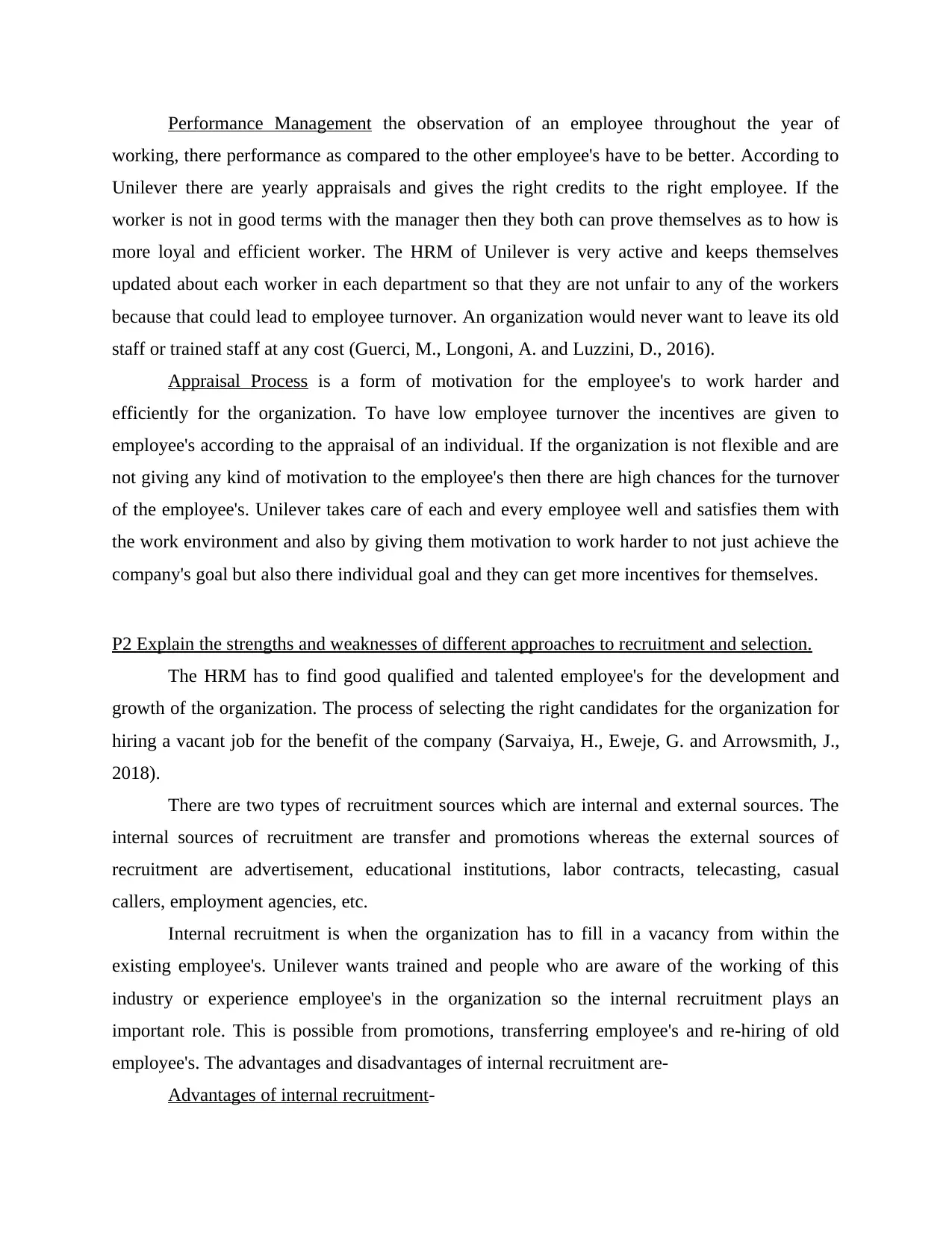
Performance Management the observation of an employee throughout the year of
working, there performance as compared to the other employee's have to be better. According to
Unilever there are yearly appraisals and gives the right credits to the right employee. If the
worker is not in good terms with the manager then they both can prove themselves as to how is
more loyal and efficient worker. The HRM of Unilever is very active and keeps themselves
updated about each worker in each department so that they are not unfair to any of the workers
because that could lead to employee turnover. An organization would never want to leave its old
staff or trained staff at any cost (Guerci, M., Longoni, A. and Luzzini, D., 2016).
Appraisal Process is a form of motivation for the employee's to work harder and
efficiently for the organization. To have low employee turnover the incentives are given to
employee's according to the appraisal of an individual. If the organization is not flexible and are
not giving any kind of motivation to the employee's then there are high chances for the turnover
of the employee's. Unilever takes care of each and every employee well and satisfies them with
the work environment and also by giving them motivation to work harder to not just achieve the
company's goal but also there individual goal and they can get more incentives for themselves.
P2 Explain the strengths and weaknesses of different approaches to recruitment and selection.
The HRM has to find good qualified and talented employee's for the development and
growth of the organization. The process of selecting the right candidates for the organization for
hiring a vacant job for the benefit of the company (Sarvaiya, H., Eweje, G. and Arrowsmith, J.,
2018).
There are two types of recruitment sources which are internal and external sources. The
internal sources of recruitment are transfer and promotions whereas the external sources of
recruitment are advertisement, educational institutions, labor contracts, telecasting, casual
callers, employment agencies, etc.
Internal recruitment is when the organization has to fill in a vacancy from within the
existing employee's. Unilever wants trained and people who are aware of the working of this
industry or experience employee's in the organization so the internal recruitment plays an
important role. This is possible from promotions, transferring employee's and re-hiring of old
employee's. The advantages and disadvantages of internal recruitment are-
Advantages of internal recruitment-
working, there performance as compared to the other employee's have to be better. According to
Unilever there are yearly appraisals and gives the right credits to the right employee. If the
worker is not in good terms with the manager then they both can prove themselves as to how is
more loyal and efficient worker. The HRM of Unilever is very active and keeps themselves
updated about each worker in each department so that they are not unfair to any of the workers
because that could lead to employee turnover. An organization would never want to leave its old
staff or trained staff at any cost (Guerci, M., Longoni, A. and Luzzini, D., 2016).
Appraisal Process is a form of motivation for the employee's to work harder and
efficiently for the organization. To have low employee turnover the incentives are given to
employee's according to the appraisal of an individual. If the organization is not flexible and are
not giving any kind of motivation to the employee's then there are high chances for the turnover
of the employee's. Unilever takes care of each and every employee well and satisfies them with
the work environment and also by giving them motivation to work harder to not just achieve the
company's goal but also there individual goal and they can get more incentives for themselves.
P2 Explain the strengths and weaknesses of different approaches to recruitment and selection.
The HRM has to find good qualified and talented employee's for the development and
growth of the organization. The process of selecting the right candidates for the organization for
hiring a vacant job for the benefit of the company (Sarvaiya, H., Eweje, G. and Arrowsmith, J.,
2018).
There are two types of recruitment sources which are internal and external sources. The
internal sources of recruitment are transfer and promotions whereas the external sources of
recruitment are advertisement, educational institutions, labor contracts, telecasting, casual
callers, employment agencies, etc.
Internal recruitment is when the organization has to fill in a vacancy from within the
existing employee's. Unilever wants trained and people who are aware of the working of this
industry or experience employee's in the organization so the internal recruitment plays an
important role. This is possible from promotions, transferring employee's and re-hiring of old
employee's. The advantages and disadvantages of internal recruitment are-
Advantages of internal recruitment-
Paraphrase This Document
Need a fresh take? Get an instant paraphrase of this document with our AI Paraphraser
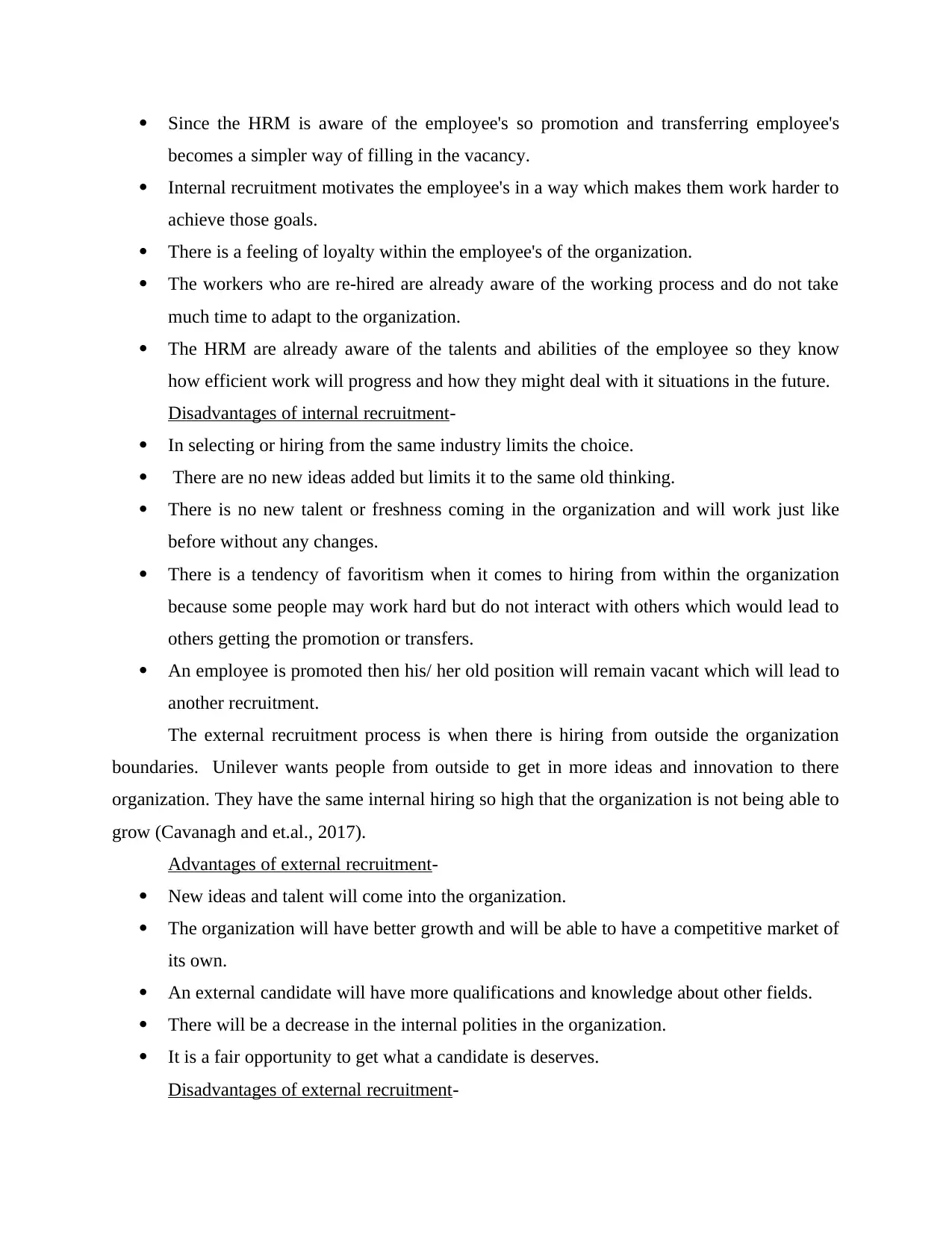
Since the HRM is aware of the employee's so promotion and transferring employee's
becomes a simpler way of filling in the vacancy.
Internal recruitment motivates the employee's in a way which makes them work harder to
achieve those goals.
There is a feeling of loyalty within the employee's of the organization.
The workers who are re-hired are already aware of the working process and do not take
much time to adapt to the organization.
The HRM are already aware of the talents and abilities of the employee so they know
how efficient work will progress and how they might deal with it situations in the future.
Disadvantages of internal recruitment-
In selecting or hiring from the same industry limits the choice.
There are no new ideas added but limits it to the same old thinking.
There is no new talent or freshness coming in the organization and will work just like
before without any changes.
There is a tendency of favoritism when it comes to hiring from within the organization
because some people may work hard but do not interact with others which would lead to
others getting the promotion or transfers.
An employee is promoted then his/ her old position will remain vacant which will lead to
another recruitment.
The external recruitment process is when there is hiring from outside the organization
boundaries. Unilever wants people from outside to get in more ideas and innovation to there
organization. They have the same internal hiring so high that the organization is not being able to
grow (Cavanagh and et.al., 2017).
Advantages of external recruitment-
New ideas and talent will come into the organization.
The organization will have better growth and will be able to have a competitive market of
its own.
An external candidate will have more qualifications and knowledge about other fields.
There will be a decrease in the internal polities in the organization.
It is a fair opportunity to get what a candidate is deserves.
Disadvantages of external recruitment-
becomes a simpler way of filling in the vacancy.
Internal recruitment motivates the employee's in a way which makes them work harder to
achieve those goals.
There is a feeling of loyalty within the employee's of the organization.
The workers who are re-hired are already aware of the working process and do not take
much time to adapt to the organization.
The HRM are already aware of the talents and abilities of the employee so they know
how efficient work will progress and how they might deal with it situations in the future.
Disadvantages of internal recruitment-
In selecting or hiring from the same industry limits the choice.
There are no new ideas added but limits it to the same old thinking.
There is no new talent or freshness coming in the organization and will work just like
before without any changes.
There is a tendency of favoritism when it comes to hiring from within the organization
because some people may work hard but do not interact with others which would lead to
others getting the promotion or transfers.
An employee is promoted then his/ her old position will remain vacant which will lead to
another recruitment.
The external recruitment process is when there is hiring from outside the organization
boundaries. Unilever wants people from outside to get in more ideas and innovation to there
organization. They have the same internal hiring so high that the organization is not being able to
grow (Cavanagh and et.al., 2017).
Advantages of external recruitment-
New ideas and talent will come into the organization.
The organization will have better growth and will be able to have a competitive market of
its own.
An external candidate will have more qualifications and knowledge about other fields.
There will be a decrease in the internal polities in the organization.
It is a fair opportunity to get what a candidate is deserves.
Disadvantages of external recruitment-
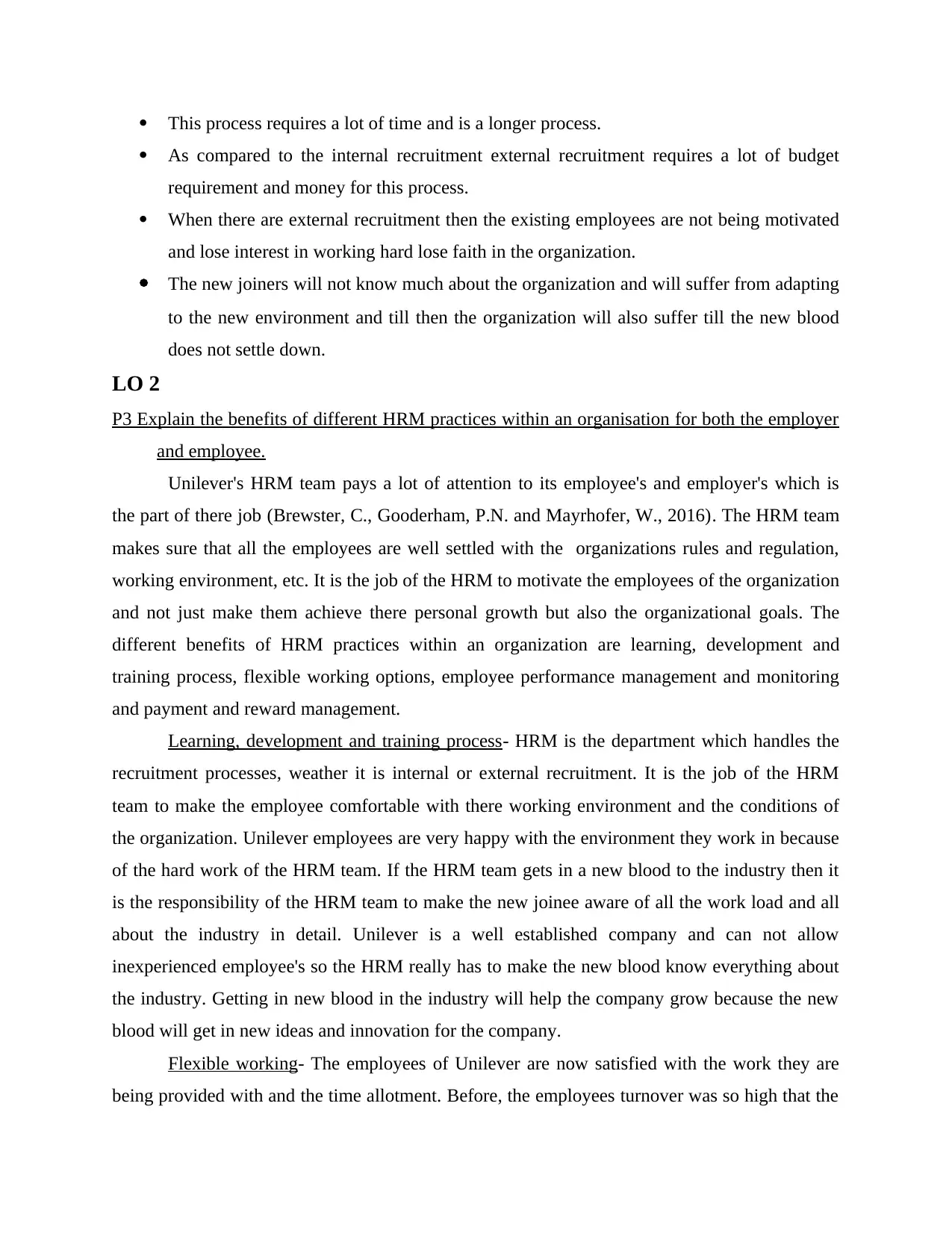
This process requires a lot of time and is a longer process.
As compared to the internal recruitment external recruitment requires a lot of budget
requirement and money for this process.
When there are external recruitment then the existing employees are not being motivated
and lose interest in working hard lose faith in the organization.
The new joiners will not know much about the organization and will suffer from adapting
to the new environment and till then the organization will also suffer till the new blood
does not settle down.
LO 2
P3 Explain the benefits of different HRM practices within an organisation for both the employer
and employee.
Unilever's HRM team pays a lot of attention to its employee's and employer's which is
the part of there job (Brewster, C., Gooderham, P.N. and Mayrhofer, W., 2016). The HRM team
makes sure that all the employees are well settled with the organizations rules and regulation,
working environment, etc. It is the job of the HRM to motivate the employees of the organization
and not just make them achieve there personal growth but also the organizational goals. The
different benefits of HRM practices within an organization are learning, development and
training process, flexible working options, employee performance management and monitoring
and payment and reward management.
Learning, development and training process- HRM is the department which handles the
recruitment processes, weather it is internal or external recruitment. It is the job of the HRM
team to make the employee comfortable with there working environment and the conditions of
the organization. Unilever employees are very happy with the environment they work in because
of the hard work of the HRM team. If the HRM team gets in a new blood to the industry then it
is the responsibility of the HRM team to make the new joinee aware of all the work load and all
about the industry in detail. Unilever is a well established company and can not allow
inexperienced employee's so the HRM really has to make the new blood know everything about
the industry. Getting in new blood in the industry will help the company grow because the new
blood will get in new ideas and innovation for the company.
Flexible working- The employees of Unilever are now satisfied with the work they are
being provided with and the time allotment. Before, the employees turnover was so high that the
As compared to the internal recruitment external recruitment requires a lot of budget
requirement and money for this process.
When there are external recruitment then the existing employees are not being motivated
and lose interest in working hard lose faith in the organization.
The new joiners will not know much about the organization and will suffer from adapting
to the new environment and till then the organization will also suffer till the new blood
does not settle down.
LO 2
P3 Explain the benefits of different HRM practices within an organisation for both the employer
and employee.
Unilever's HRM team pays a lot of attention to its employee's and employer's which is
the part of there job (Brewster, C., Gooderham, P.N. and Mayrhofer, W., 2016). The HRM team
makes sure that all the employees are well settled with the organizations rules and regulation,
working environment, etc. It is the job of the HRM to motivate the employees of the organization
and not just make them achieve there personal growth but also the organizational goals. The
different benefits of HRM practices within an organization are learning, development and
training process, flexible working options, employee performance management and monitoring
and payment and reward management.
Learning, development and training process- HRM is the department which handles the
recruitment processes, weather it is internal or external recruitment. It is the job of the HRM
team to make the employee comfortable with there working environment and the conditions of
the organization. Unilever employees are very happy with the environment they work in because
of the hard work of the HRM team. If the HRM team gets in a new blood to the industry then it
is the responsibility of the HRM team to make the new joinee aware of all the work load and all
about the industry in detail. Unilever is a well established company and can not allow
inexperienced employee's so the HRM really has to make the new blood know everything about
the industry. Getting in new blood in the industry will help the company grow because the new
blood will get in new ideas and innovation for the company.
Flexible working- The employees of Unilever are now satisfied with the work they are
being provided with and the time allotment. Before, the employees turnover was so high that the
⊘ This is a preview!⊘
Do you want full access?
Subscribe today to unlock all pages.

Trusted by 1+ million students worldwide
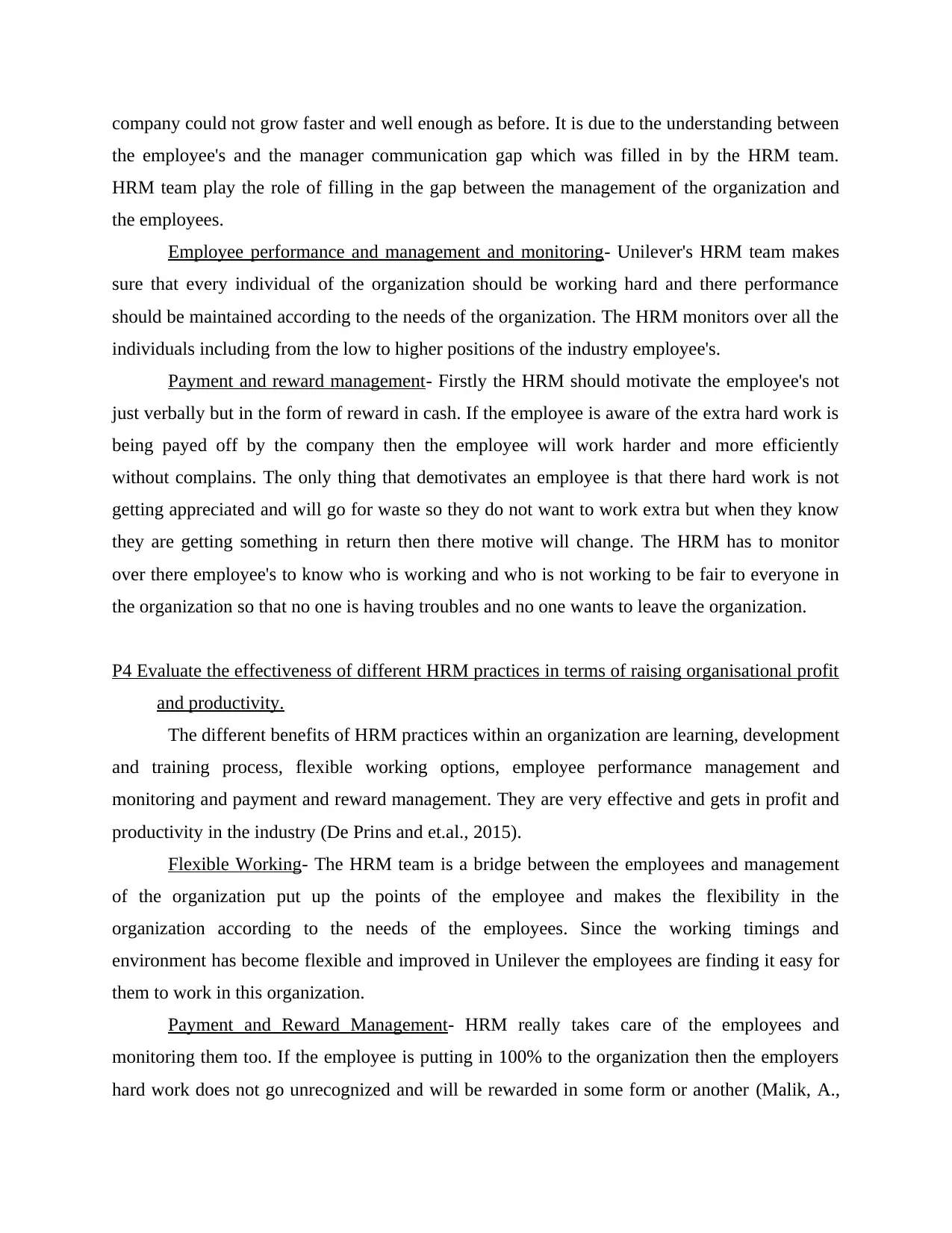
company could not grow faster and well enough as before. It is due to the understanding between
the employee's and the manager communication gap which was filled in by the HRM team.
HRM team play the role of filling in the gap between the management of the organization and
the employees.
Employee performance and management and monitoring- Unilever's HRM team makes
sure that every individual of the organization should be working hard and there performance
should be maintained according to the needs of the organization. The HRM monitors over all the
individuals including from the low to higher positions of the industry employee's.
Payment and reward management- Firstly the HRM should motivate the employee's not
just verbally but in the form of reward in cash. If the employee is aware of the extra hard work is
being payed off by the company then the employee will work harder and more efficiently
without complains. The only thing that demotivates an employee is that there hard work is not
getting appreciated and will go for waste so they do not want to work extra but when they know
they are getting something in return then there motive will change. The HRM has to monitor
over there employee's to know who is working and who is not working to be fair to everyone in
the organization so that no one is having troubles and no one wants to leave the organization.
P4 Evaluate the effectiveness of different HRM practices in terms of raising organisational profit
and productivity.
The different benefits of HRM practices within an organization are learning, development
and training process, flexible working options, employee performance management and
monitoring and payment and reward management. They are very effective and gets in profit and
productivity in the industry (De Prins and et.al., 2015).
Flexible Working- The HRM team is a bridge between the employees and management
of the organization put up the points of the employee and makes the flexibility in the
organization according to the needs of the employees. Since the working timings and
environment has become flexible and improved in Unilever the employees are finding it easy for
them to work in this organization.
Payment and Reward Management- HRM really takes care of the employees and
monitoring them too. If the employee is putting in 100% to the organization then the employers
hard work does not go unrecognized and will be rewarded in some form or another (Malik, A.,
the employee's and the manager communication gap which was filled in by the HRM team.
HRM team play the role of filling in the gap between the management of the organization and
the employees.
Employee performance and management and monitoring- Unilever's HRM team makes
sure that every individual of the organization should be working hard and there performance
should be maintained according to the needs of the organization. The HRM monitors over all the
individuals including from the low to higher positions of the industry employee's.
Payment and reward management- Firstly the HRM should motivate the employee's not
just verbally but in the form of reward in cash. If the employee is aware of the extra hard work is
being payed off by the company then the employee will work harder and more efficiently
without complains. The only thing that demotivates an employee is that there hard work is not
getting appreciated and will go for waste so they do not want to work extra but when they know
they are getting something in return then there motive will change. The HRM has to monitor
over there employee's to know who is working and who is not working to be fair to everyone in
the organization so that no one is having troubles and no one wants to leave the organization.
P4 Evaluate the effectiveness of different HRM practices in terms of raising organisational profit
and productivity.
The different benefits of HRM practices within an organization are learning, development
and training process, flexible working options, employee performance management and
monitoring and payment and reward management. They are very effective and gets in profit and
productivity in the industry (De Prins and et.al., 2015).
Flexible Working- The HRM team is a bridge between the employees and management
of the organization put up the points of the employee and makes the flexibility in the
organization according to the needs of the employees. Since the working timings and
environment has become flexible and improved in Unilever the employees are finding it easy for
them to work in this organization.
Payment and Reward Management- HRM really takes care of the employees and
monitoring them too. If the employee is putting in 100% to the organization then the employers
hard work does not go unrecognized and will be rewarded in some form or another (Malik, A.,
Paraphrase This Document
Need a fresh take? Get an instant paraphrase of this document with our AI Paraphraser
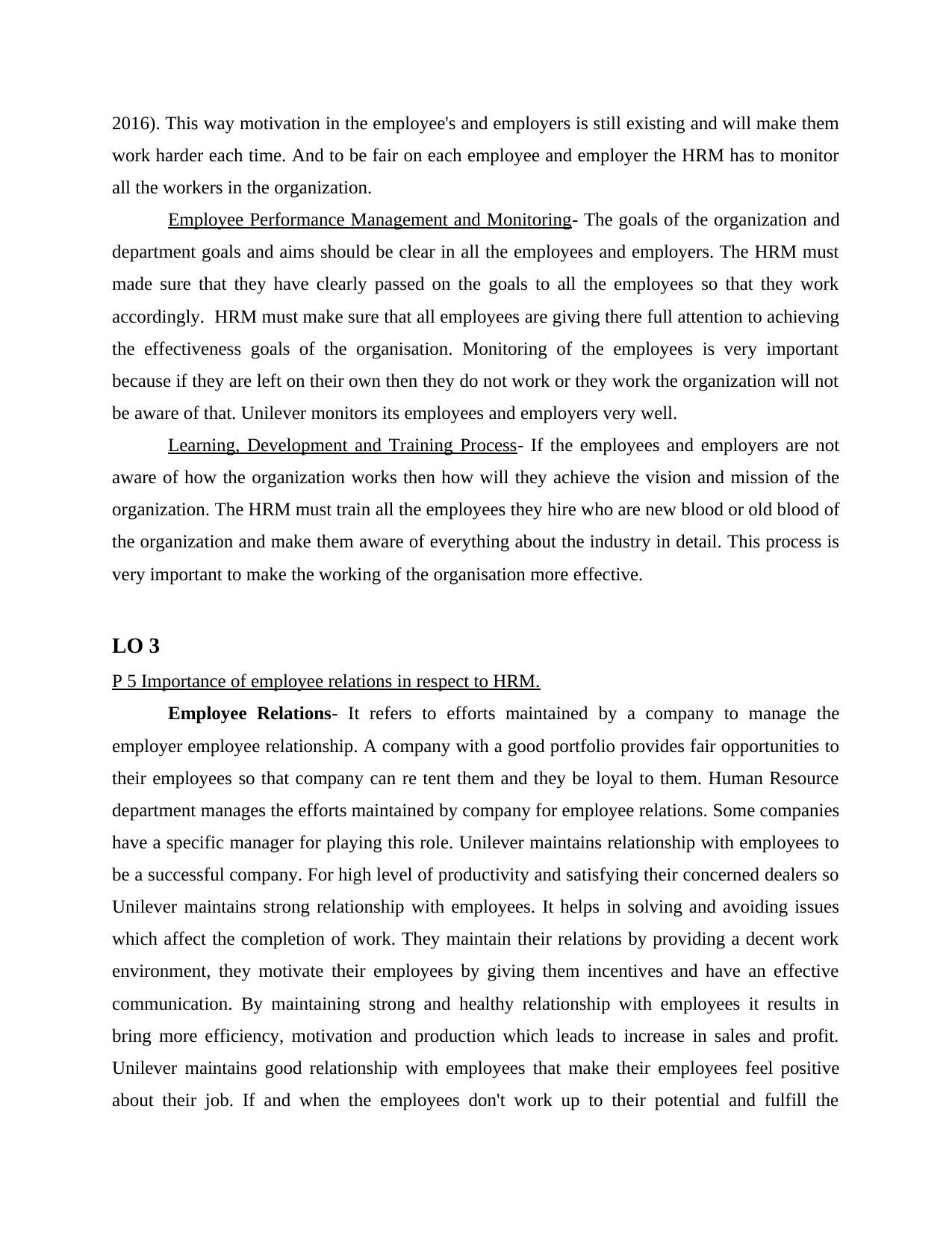
2016). This way motivation in the employee's and employers is still existing and will make them
work harder each time. And to be fair on each employee and employer the HRM has to monitor
all the workers in the organization.
Employee Performance Management and Monitoring- The goals of the organization and
department goals and aims should be clear in all the employees and employers. The HRM must
made sure that they have clearly passed on the goals to all the employees so that they work
accordingly. HRM must make sure that all employees are giving there full attention to achieving
the effectiveness goals of the organisation. Monitoring of the employees is very important
because if they are left on their own then they do not work or they work the organization will not
be aware of that. Unilever monitors its employees and employers very well.
Learning, Development and Training Process- If the employees and employers are not
aware of how the organization works then how will they achieve the vision and mission of the
organization. The HRM must train all the employees they hire who are new blood or old blood of
the organization and make them aware of everything about the industry in detail. This process is
very important to make the working of the organisation more effective.
LO 3
P 5 Importance of employee relations in respect to HRM.
Employee Relations- It refers to efforts maintained by a company to manage the
employer employee relationship. A company with a good portfolio provides fair opportunities to
their employees so that company can re tent them and they be loyal to them. Human Resource
department manages the efforts maintained by company for employee relations. Some companies
have a specific manager for playing this role. Unilever maintains relationship with employees to
be a successful company. For high level of productivity and satisfying their concerned dealers so
Unilever maintains strong relationship with employees. It helps in solving and avoiding issues
which affect the completion of work. They maintain their relations by providing a decent work
environment, they motivate their employees by giving them incentives and have an effective
communication. By maintaining strong and healthy relationship with employees it results in
bring more efficiency, motivation and production which leads to increase in sales and profit.
Unilever maintains good relationship with employees that make their employees feel positive
about their job. If and when the employees don't work up to their potential and fulfill the
work harder each time. And to be fair on each employee and employer the HRM has to monitor
all the workers in the organization.
Employee Performance Management and Monitoring- The goals of the organization and
department goals and aims should be clear in all the employees and employers. The HRM must
made sure that they have clearly passed on the goals to all the employees so that they work
accordingly. HRM must make sure that all employees are giving there full attention to achieving
the effectiveness goals of the organisation. Monitoring of the employees is very important
because if they are left on their own then they do not work or they work the organization will not
be aware of that. Unilever monitors its employees and employers very well.
Learning, Development and Training Process- If the employees and employers are not
aware of how the organization works then how will they achieve the vision and mission of the
organization. The HRM must train all the employees they hire who are new blood or old blood of
the organization and make them aware of everything about the industry in detail. This process is
very important to make the working of the organisation more effective.
LO 3
P 5 Importance of employee relations in respect to HRM.
Employee Relations- It refers to efforts maintained by a company to manage the
employer employee relationship. A company with a good portfolio provides fair opportunities to
their employees so that company can re tent them and they be loyal to them. Human Resource
department manages the efforts maintained by company for employee relations. Some companies
have a specific manager for playing this role. Unilever maintains relationship with employees to
be a successful company. For high level of productivity and satisfying their concerned dealers so
Unilever maintains strong relationship with employees. It helps in solving and avoiding issues
which affect the completion of work. They maintain their relations by providing a decent work
environment, they motivate their employees by giving them incentives and have an effective
communication. By maintaining strong and healthy relationship with employees it results in
bring more efficiency, motivation and production which leads to increase in sales and profit.
Unilever maintains good relationship with employees that make their employees feel positive
about their job. If and when the employees don't work up to their potential and fulfill the
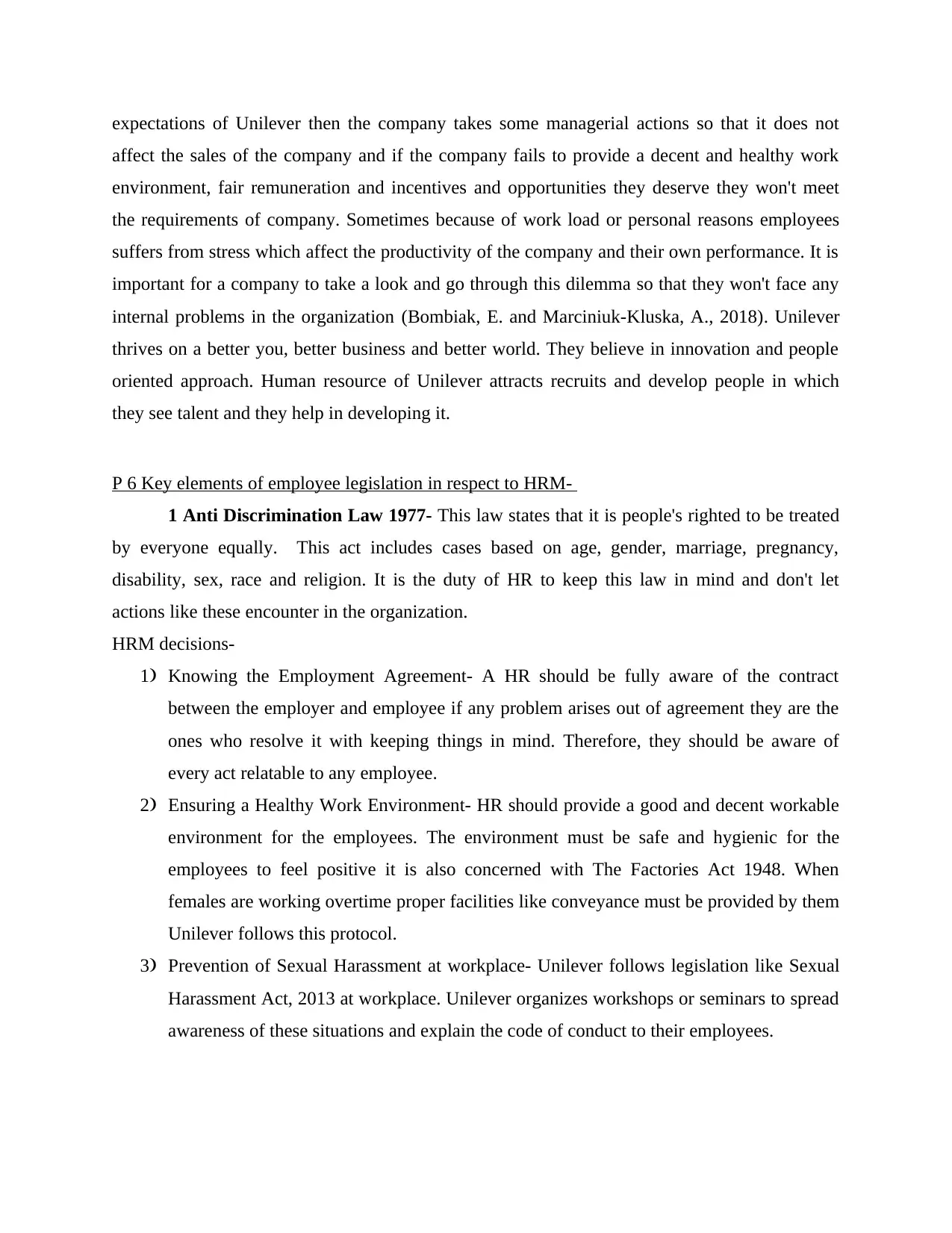
expectations of Unilever then the company takes some managerial actions so that it does not
affect the sales of the company and if the company fails to provide a decent and healthy work
environment, fair remuneration and incentives and opportunities they deserve they won't meet
the requirements of company. Sometimes because of work load or personal reasons employees
suffers from stress which affect the productivity of the company and their own performance. It is
important for a company to take a look and go through this dilemma so that they won't face any
internal problems in the organization (Bombiak, E. and Marciniuk-Kluska, A., 2018). Unilever
thrives on a better you, better business and better world. They believe in innovation and people
oriented approach. Human resource of Unilever attracts recruits and develop people in which
they see talent and they help in developing it.
P 6 Key elements of employee legislation in respect to HRM-
1 Anti Discrimination Law 1977- This law states that it is people's righted to be treated
by everyone equally. This act includes cases based on age, gender, marriage, pregnancy,
disability, sex, race and religion. It is the duty of HR to keep this law in mind and don't let
actions like these encounter in the organization.
HRM decisions-
1) Knowing the Employment Agreement- A HR should be fully aware of the contract
between the employer and employee if any problem arises out of agreement they are the
ones who resolve it with keeping things in mind. Therefore, they should be aware of
every act relatable to any employee.
2) Ensuring a Healthy Work Environment- HR should provide a good and decent workable
environment for the employees. The environment must be safe and hygienic for the
employees to feel positive it is also concerned with The Factories Act 1948. When
females are working overtime proper facilities like conveyance must be provided by them
Unilever follows this protocol.
3) Prevention of Sexual Harassment at workplace- Unilever follows legislation like Sexual
Harassment Act, 2013 at workplace. Unilever organizes workshops or seminars to spread
awareness of these situations and explain the code of conduct to their employees.
affect the sales of the company and if the company fails to provide a decent and healthy work
environment, fair remuneration and incentives and opportunities they deserve they won't meet
the requirements of company. Sometimes because of work load or personal reasons employees
suffers from stress which affect the productivity of the company and their own performance. It is
important for a company to take a look and go through this dilemma so that they won't face any
internal problems in the organization (Bombiak, E. and Marciniuk-Kluska, A., 2018). Unilever
thrives on a better you, better business and better world. They believe in innovation and people
oriented approach. Human resource of Unilever attracts recruits and develop people in which
they see talent and they help in developing it.
P 6 Key elements of employee legislation in respect to HRM-
1 Anti Discrimination Law 1977- This law states that it is people's righted to be treated
by everyone equally. This act includes cases based on age, gender, marriage, pregnancy,
disability, sex, race and religion. It is the duty of HR to keep this law in mind and don't let
actions like these encounter in the organization.
HRM decisions-
1) Knowing the Employment Agreement- A HR should be fully aware of the contract
between the employer and employee if any problem arises out of agreement they are the
ones who resolve it with keeping things in mind. Therefore, they should be aware of
every act relatable to any employee.
2) Ensuring a Healthy Work Environment- HR should provide a good and decent workable
environment for the employees. The environment must be safe and hygienic for the
employees to feel positive it is also concerned with The Factories Act 1948. When
females are working overtime proper facilities like conveyance must be provided by them
Unilever follows this protocol.
3) Prevention of Sexual Harassment at workplace- Unilever follows legislation like Sexual
Harassment Act, 2013 at workplace. Unilever organizes workshops or seminars to spread
awareness of these situations and explain the code of conduct to their employees.
⊘ This is a preview!⊘
Do you want full access?
Subscribe today to unlock all pages.

Trusted by 1+ million students worldwide
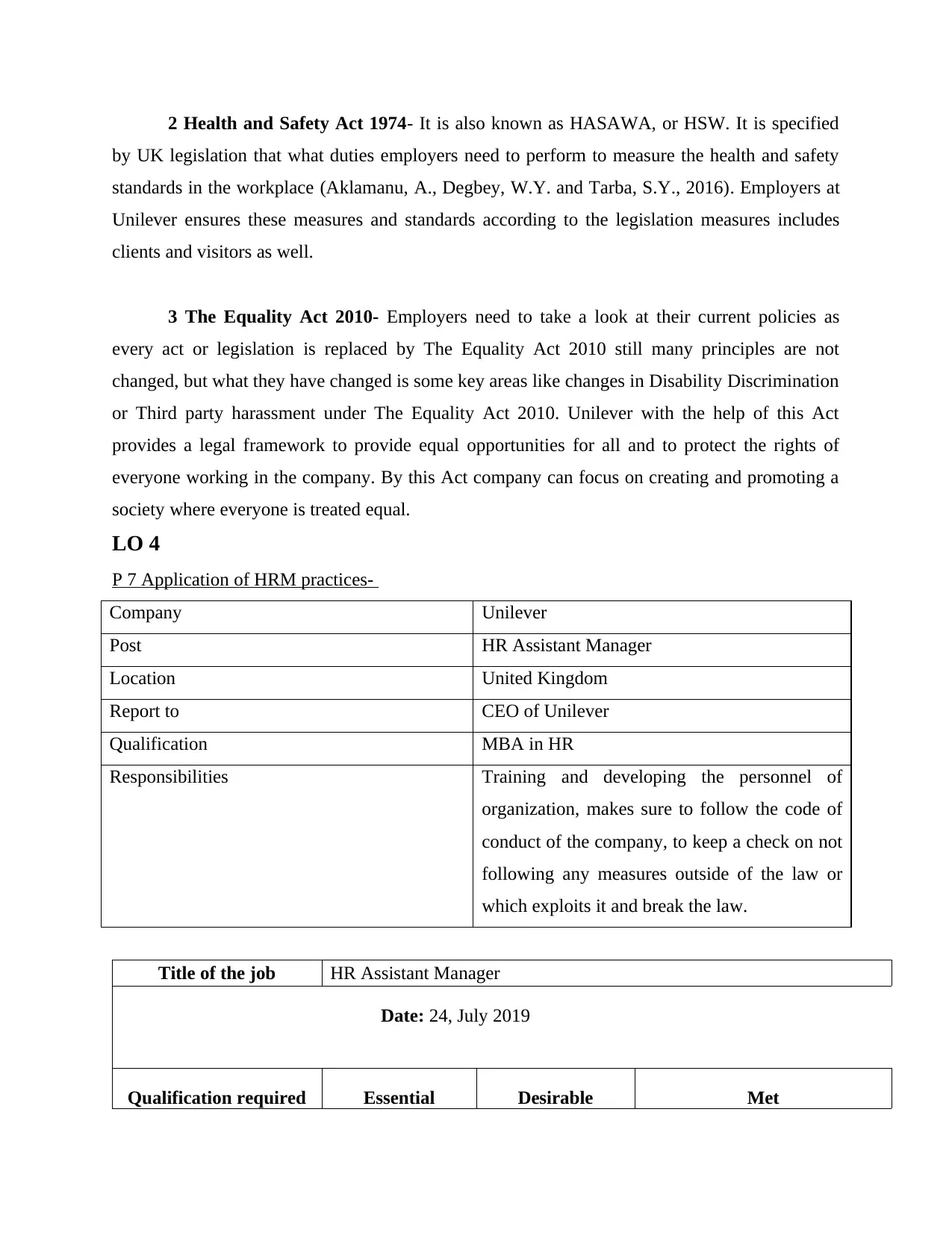
2 Health and Safety Act 1974- It is also known as HASAWA, or HSW. It is specified
by UK legislation that what duties employers need to perform to measure the health and safety
standards in the workplace (Aklamanu, A., Degbey, W.Y. and Tarba, S.Y., 2016). Employers at
Unilever ensures these measures and standards according to the legislation measures includes
clients and visitors as well.
3 The Equality Act 2010- Employers need to take a look at their current policies as
every act or legislation is replaced by The Equality Act 2010 still many principles are not
changed, but what they have changed is some key areas like changes in Disability Discrimination
or Third party harassment under The Equality Act 2010. Unilever with the help of this Act
provides a legal framework to provide equal opportunities for all and to protect the rights of
everyone working in the company. By this Act company can focus on creating and promoting a
society where everyone is treated equal.
LO 4
P 7 Application of HRM practices-
Company Unilever
Post HR Assistant Manager
Location United Kingdom
Report to CEO of Unilever
Qualification MBA in HR
Responsibilities Training and developing the personnel of
organization, makes sure to follow the code of
conduct of the company, to keep a check on not
following any measures outside of the law or
which exploits it and break the law.
Title of the job HR Assistant Manager
Date: 24, July 2019
Qualification required Essential Desirable Met
by UK legislation that what duties employers need to perform to measure the health and safety
standards in the workplace (Aklamanu, A., Degbey, W.Y. and Tarba, S.Y., 2016). Employers at
Unilever ensures these measures and standards according to the legislation measures includes
clients and visitors as well.
3 The Equality Act 2010- Employers need to take a look at their current policies as
every act or legislation is replaced by The Equality Act 2010 still many principles are not
changed, but what they have changed is some key areas like changes in Disability Discrimination
or Third party harassment under The Equality Act 2010. Unilever with the help of this Act
provides a legal framework to provide equal opportunities for all and to protect the rights of
everyone working in the company. By this Act company can focus on creating and promoting a
society where everyone is treated equal.
LO 4
P 7 Application of HRM practices-
Company Unilever
Post HR Assistant Manager
Location United Kingdom
Report to CEO of Unilever
Qualification MBA in HR
Responsibilities Training and developing the personnel of
organization, makes sure to follow the code of
conduct of the company, to keep a check on not
following any measures outside of the law or
which exploits it and break the law.
Title of the job HR Assistant Manager
Date: 24, July 2019
Qualification required Essential Desirable Met
Paraphrase This Document
Need a fresh take? Get an instant paraphrase of this document with our AI Paraphraser
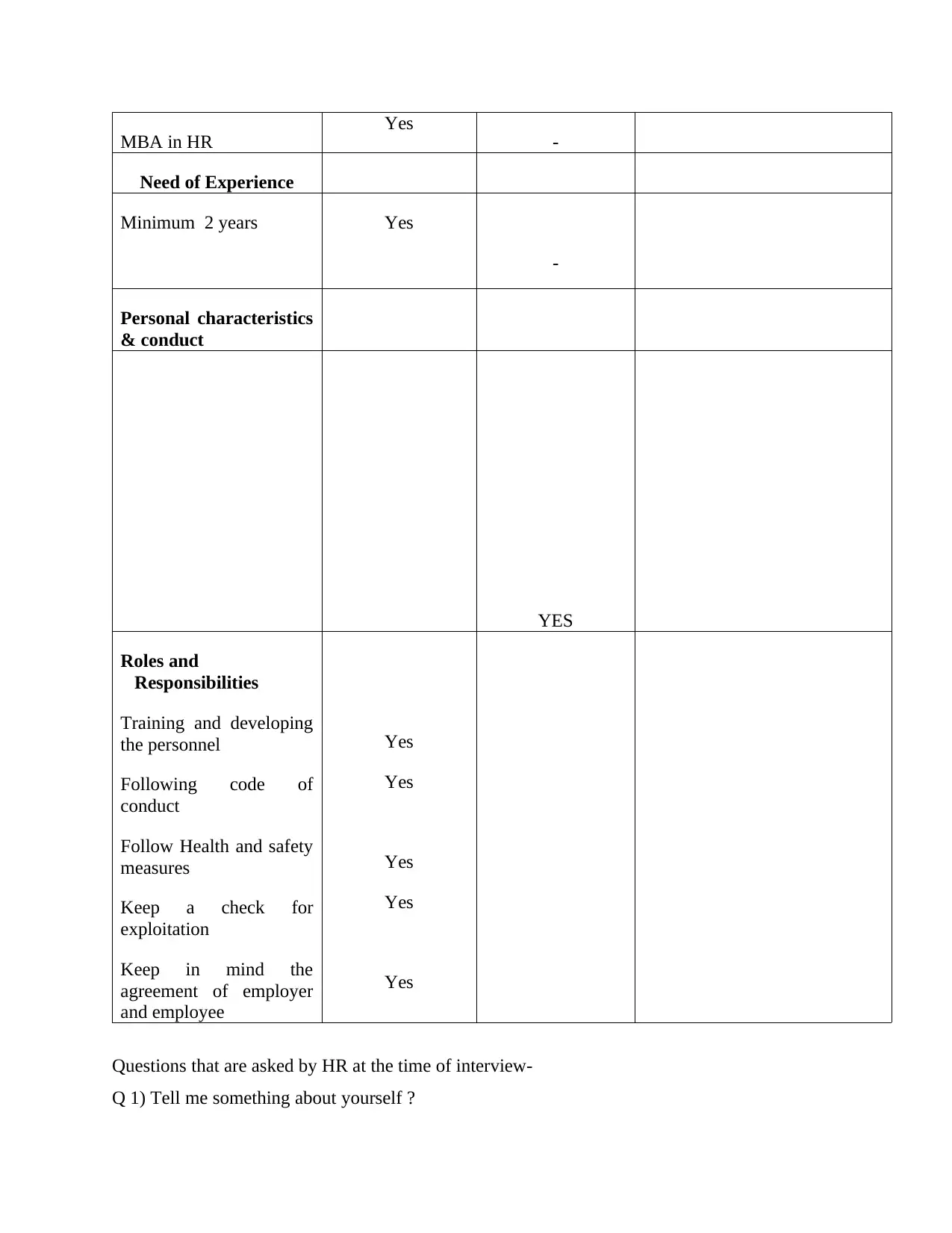
MBA in HR Yes -
Need of Experience
Minimum 2 years Yes
-
Personal characteristics
& conduct
YES
Roles and
Responsibilities
Training and developing
the personnel
Following code of
conduct
Follow Health and safety
measures
Keep a check for
exploitation
Keep in mind the
agreement of employer
and employee
Yes
Yes
Yes
Yes
Yes
Questions that are asked by HR at the time of interview-
Q 1) Tell me something about yourself ?
Need of Experience
Minimum 2 years Yes
-
Personal characteristics
& conduct
YES
Roles and
Responsibilities
Training and developing
the personnel
Following code of
conduct
Follow Health and safety
measures
Keep a check for
exploitation
Keep in mind the
agreement of employer
and employee
Yes
Yes
Yes
Yes
Yes
Questions that are asked by HR at the time of interview-
Q 1) Tell me something about yourself ?
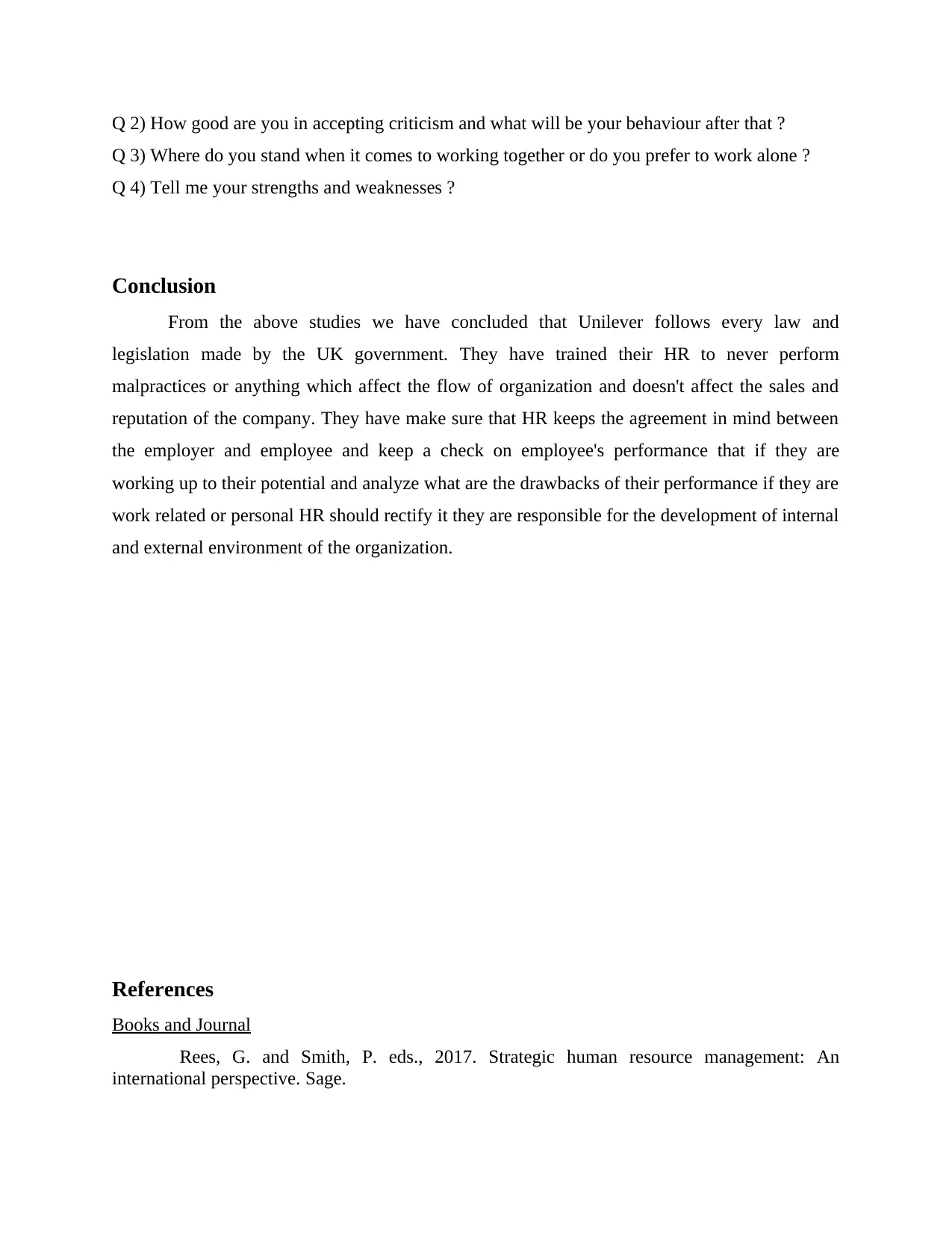
Q 2) How good are you in accepting criticism and what will be your behaviour after that ?
Q 3) Where do you stand when it comes to working together or do you prefer to work alone ?
Q 4) Tell me your strengths and weaknesses ?
Conclusion
From the above studies we have concluded that Unilever follows every law and
legislation made by the UK government. They have trained their HR to never perform
malpractices or anything which affect the flow of organization and doesn't affect the sales and
reputation of the company. They have make sure that HR keeps the agreement in mind between
the employer and employee and keep a check on employee's performance that if they are
working up to their potential and analyze what are the drawbacks of their performance if they are
work related or personal HR should rectify it they are responsible for the development of internal
and external environment of the organization.
References
Books and Journal
Rees, G. and Smith, P. eds., 2017. Strategic human resource management: An
international perspective. Sage.
Q 3) Where do you stand when it comes to working together or do you prefer to work alone ?
Q 4) Tell me your strengths and weaknesses ?
Conclusion
From the above studies we have concluded that Unilever follows every law and
legislation made by the UK government. They have trained their HR to never perform
malpractices or anything which affect the flow of organization and doesn't affect the sales and
reputation of the company. They have make sure that HR keeps the agreement in mind between
the employer and employee and keep a check on employee's performance that if they are
working up to their potential and analyze what are the drawbacks of their performance if they are
work related or personal HR should rectify it they are responsible for the development of internal
and external environment of the organization.
References
Books and Journal
Rees, G. and Smith, P. eds., 2017. Strategic human resource management: An
international perspective. Sage.
⊘ This is a preview!⊘
Do you want full access?
Subscribe today to unlock all pages.

Trusted by 1+ million students worldwide
1 out of 13
Related Documents
Your All-in-One AI-Powered Toolkit for Academic Success.
+13062052269
info@desklib.com
Available 24*7 on WhatsApp / Email
![[object Object]](/_next/static/media/star-bottom.7253800d.svg)
Unlock your academic potential
Copyright © 2020–2026 A2Z Services. All Rights Reserved. Developed and managed by ZUCOL.



